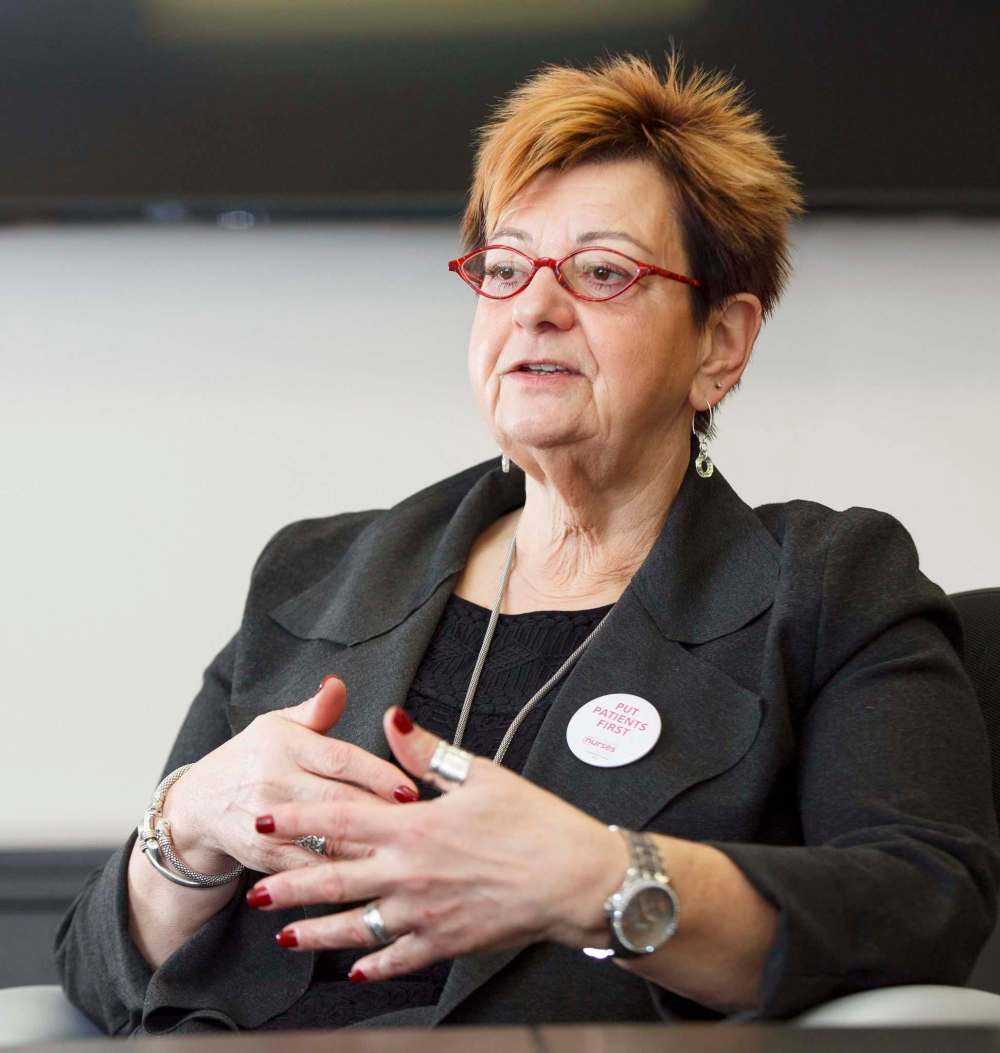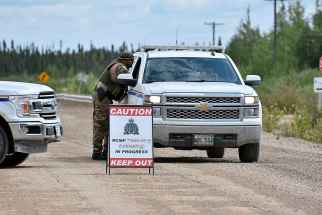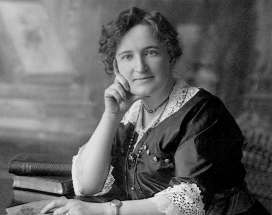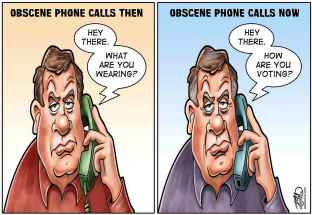Unions decry expensive forced battle to win health workers’ votes
Read this article for free:
or
Already have an account? Log in here »
To continue reading, please subscribe:
Monthly Digital Subscription
$0 for the first 4 weeks*
- Enjoy unlimited reading on winnipegfreepress.com
- Read the E-Edition, our digital replica newspaper
- Access News Break, our award-winning app
- Play interactive puzzles
*No charge for 4 weeks then price increases to the regular rate of $19.00 plus GST every four weeks. Offer available to new and qualified returning subscribers only. Cancel any time.
Monthly Digital Subscription
$4.75/week*
- Enjoy unlimited reading on winnipegfreepress.com
- Read the E-Edition, our digital replica newspaper
- Access News Break, our award-winning app
- Play interactive puzzles
*Billed as $19 plus GST every four weeks. Cancel any time.
To continue reading, please subscribe:
Add Free Press access to your Brandon Sun subscription for only an additional
$1 for the first 4 weeks*
*Your next subscription payment will increase by $1.00 and you will be charged $16.99 plus GST for four weeks. After four weeks, your payment will increase to $23.99 plus GST every four weeks.
Read unlimited articles for free today:
or
Already have an account? Log in here »
Hey there, time traveller!
This article was published 06/08/2019 (2319 days ago), so information in it may no longer be current.
After more than two years of expensive campaigning that has pitted unions against each other to secure their memberships, health-care workers will, finally, get to choose who represents them.
Two weeks of voting starts Thursday.
Thirteen unions are taking part in health-care representation votes. The exercise was instigated after the provincial government introduced Bill 29 (The Health Sector Bargaining Unit Review Act) in 2017.

The Progressive Conservatives want to see more than 180 bargaining units consolidated into 36 groups. According to commissioner Robert Pruden’s website, there are about 49,000 union members affected working in 300 health-care locations across the province.
Employees are grouped into the following categories, which unions are vying to represent with new collective agreements: community support; facility support; nurses; professional, technical and paramedical (PTP) staff; physician assistants and clinical assistants; physicians; and medical residents.
In some cases votes won’t be cast because one union already covers an area; such is the case for nurses in the Northern Regional Health Authority who are represented by the Manitoba Nurses Union.
MNU president Darlene Jackson said she was frustrated the union had to participate in a campaign to woo back about 10,000 of its members in Shared Health, Southern Health and the Winnipeg Regional Health Authority.
“It’s a little frustrating, it’s very time-consuming and it’s a lot of work. And it’s at a time when nurses already feel like they’re being pushed. There’s so many changes, there’s so many cuts.”
– MNU president Darlene Jackson
“We already represent 97 per cent of the nurses (in Manitoba),” Jackson said, noting the MNU asked the government to eliminate voting in their sector for that reason, but were told the votes would go ahead.
“So it’s a little frustrating, it’s very time-consuming and it’s a lot of work. And it’s at a time when nurses already feel like they’re being pushed. There’s so many changes, there’s so many cuts,” she said, describing the ongoing Healing Our Health System overhaul.
Three other union leaders who spoke to the Free Press Tuesday expressed similar concerns about the votes being unnecessary. They noted voting could have been avoided altogether had the province accepted their joint proposal to consolidate bargaining at a single table for each profession.
THE UNIONS
Canadian Union of Public Employees (CUPE)
Who do they currently represent? About 11,000 health-care workers, including community support staff, facility support staff, nurses, physicians, professional, technical and paramedical (PTP) staff.
Who are they hoping to represent? All of the above and any new health-care workers who want to join them.
How are they campaigning? Through in-person meetings inside and outside of health-care facilities; through advertising in print, online and on the radio, as well as outdoor advertisements on billboards, bus benches and recycling bins.
How much are they spending on campaigning? “It’s a huge investment, let’s put it that way,” said Liz Carlyle, a CUPE servicing representative, who declined to give an exact or estimated amount.
Who do they currently represent? About 11,000 health-care workers, including community support staff, facility support staff, nurses, physicians, professional, technical and paramedical (PTP) staff.
Who are they hoping to represent? All of the above and any new health-care workers who want to join them.
How are they campaigning? Through in-person meetings inside and outside of health-care facilities; through advertising in print, online and on the radio, as well as outdoor advertisements on billboards, bus benches and recycling bins.
How much are they spending on campaigning? “It’s a huge investment, let’s put it that way,” said Liz Carlyle, a CUPE servicing representative, who declined to give an exact or estimated amount.
Manitoba Association of Health Care Professionals (MAHCP)
Who do they currently represent? More than 4,000 members in the professional, technical and paramedical (PTP) sector.
Who are they hoping to represent? The same members and possibly more.
How are they campaigning? Mainly through in-person meetings and also a campaign website.
How much are they spending on campaigning? “We’re going to report that number to our membership at our AGM in October,” said MAHCP president Bob Moroz, who wouldn’t give a ball-park estimate.
Manitoba Government and General Employees’ Union (MGEU)
Who do they currently represent? About 17,000 health-care workers, who work in hospitals, personal care homes and labs, and in the community, including paramedics and home care workers.
Who are they hoping to represent? Community support, facility support and professional/technical/paramedical (PTP) staff, as well as nurses in some regions.
How are they campaigning? In-person meetings with members and eligible voters, telephone town halls and a “Care Comes First” ad campaign, with online, print, radio and television ads, plus outdoor ads on billboards, bus benches and recycling bins.
How much are they spending on campaigning? “I believe that every union has put millions into promoting their own union. I don’t have a final tally yet and I would have to report that to the board before I can report it to anybody,” MGEU president Michelle Gawronsky said.
Manitoba Nurses Union (MNU)
Who do they currently represent? About 12,000 nurses province-wide.
Who are they hoping to represent? Their current cohort of nurses and maybe more.
How are they campaigning? Meeting with nurses in pop-up booths at health-care facilities, doing advertising online and on social media.
How much are they spending on campaigning? Less than $1 million, according to MNU president Darlene Jackson. She wouldn’t elaborate on the exact cost of the campaign, but noted members approved their budget at the union’s last annual general meeting.
Operating Engineers of Manitoba Local 987
Who do they currently represent? About 1,100 members in community support, facility support, professional, technical and paramedical support, and nursing.
Who are they hoping to represent? Community and facility support workers.
How are they campaigning? Meeting with health-care workers at pop-up kiosks, running billboard, print, radio and social media ads.
How much are they spending on campaigning? Around $1 million, according to business manager Marc Lafond.
Public Service Alliance of Canada – Prairie Region
Who do they currently represent? More than 400 workers at Deer Lodge Centre in community support, facility support and nursing.
Who are they hoping to represent? No response.
How are they campaigning? How much are they spending on campaigning? In an email, PSAC Prairie Regional Executive Vice-President Marianne Hladun declined to elaborate on their union’s “specific strategy” or how much they are spending on the campaign.
UFCW Local 832
Unable to respond by deadline Tuesday.
Physician and Clinical Assistants of Manitoba, Professional Association of Residents and Interns of Manitoba (PARIM) and Unifor Local 4209
No response Tuesday.
– Jessica Botelho-Urbanski
Michelle Gawronsky, president of the Manitoba Government and General Employees’ Union (MGEU), estimated all the unions’ representation campaigns have cost millions of dollars in members’ dues.
She wouldn’t say how much MGEU is spending, but noted the amount will be tallied after the campaign and shared with MGEU members first.
“I think they have the premier to thank for that (cost). It’s the premier that’s put us into this position and I believe this was his intent,” she said.
“While we are busy trying to hold onto our members and be able to represent Manitobans, (Pallister) is very busy out there closing ERs and sending home care into an upheaval everywhere.”
Manitoba Association of Health Care Professionals (MAHCP) president Bob Moroz also had misgivings about the timing, which is starting as a provincial election campaign gets underway.
“The reality is… there certainly is a provincial election coming and it’s no secret that our current government is no fan of labour. So yeah, I definitely think there was a strategy involved to have unions spend their members’ resources and battle one another in the hopes that we’re not paying attention to what’s really going on in health care,” Moroz said, noting his union has been able to sustain focus on health-care system changes, too.
Some unions — including Unifor and the Canadian Union of Public Employees — have registered, or plan to, as third parties in the provincial election. Both have already started taking out ads decrying Brian Pallister’s approach to health-care (Unifor) and warning Manitoba Hydro may be privatized if the PCs are re-elected (CUPE).
In a Facebook video ad posted in the spring, Marc Lafond, business manager for Operational Engineers Local 987, stood outside the Manitoba legislature talking about how his union was “willing to stand up to Brian Pallister and his government.”
“I don’t think anybody wants to go through this (voting) exercise… because it pits union against union,” he said in an interview Tuesday.
“I know for ourselves, we anticipate a win. But it’s just going to come at a price for the labour movement as a whole.”
Health-care workers can cast ballots online or by phone from Thursday until Aug. 22.
jessica.botelho@freepress.mb.ca
Twitter: @_jessbu


















